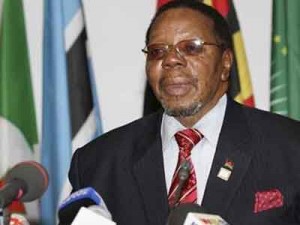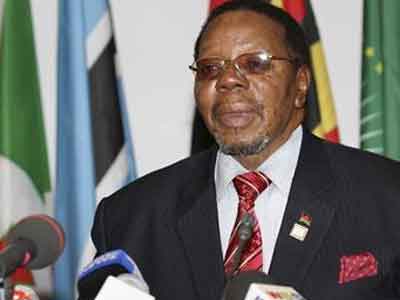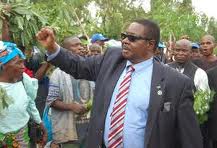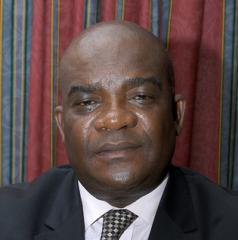The Public Affairs Committee, a group comprising religious and civic leaders, asked Mutharika to either find solutions to Malawi’s problems, or resign. He was given 60 days. Twenty-five days into the ultimatum, he suffered a massive heart attack and died. It was the worst possible nightmare for the Democratic Progressive Party. Members started breaking ranks, in the process revealing plots to prevent the Vice President, who remained in office by virtue of the constitution, from acceding to the presidency. Rumours indicated that the army stepped in quickly but quietly and made it clear to everyone that the constitution was supreme.

President Joyce Banda became southern Africa’s first ever and Africa’s second female head of state. Her coming to power has so far shown there’s a restoration of ties with donors so aid can resume and the economy can breathe again. Mutharika was overtly troubled by the conspicuous economic vulnerability of Malawi, an economy held hostage by the West, but seemed oblivious that it was his own abysmal diplomatic skills that made that problem so apparent. The future of Malawian politics will need to shine a bright light on this problem.
Current thinking on governance is turning toward “developmental leadership” in which coalitions are seen as key. Women leaders are thought to be better at exercising “power with” rather than “power over,” which renders itself to coalition building. But the tendency is to focus on individuals rather than systems. Power politics changes people, and as long as we remain unaware of how this happens, we will continue ending up disappointed by overly ambitious expectations. Malawians are conflicted about events of the past few days: mourning a departed leader while at the same time celebrating what appears to be a new opportunity for a fresh start. On their own, female leaders may not necessarily change African politics. But there is a body of scholarly evidence that women’s presence does play a moderating influence on machismo. Two on the continent is a good place to start, and Malawians seem eager to spearhead the transformation.
Signs started a few months after the May 2009 re-election. He announced that access to the University of Malawi, perennially one of the lowest in Africa and in the world, would be based on a quota system rather than on full merit. Next came a single-minded determination to change the Malawi flag. A rising sun full of symbolic potential was changed to a full sun; an argument for how Mutharika had so developed Malawi it was no longer a developing nation. That came complete with fabricated surveys and TV mikes pushed in front of traditional chiefs forced to defend the flag change.
It started looking like President wa Mutharika was not fond of listening to opposing views. In December 2010 the Vice President, Mrs Joyce Banda, was expelled from the Democratic Progressive Party, for allegedly forming “parallel structures”, code for being ambitious to contest for the presidency in 2014. On February 12 the Inspector General of Police Peter Mukhito (who has now been sacked by Mrs Banda) summoned Dr Blessings Chinsinga, political science lecturer in the University of Malawi. Dr Chinsinga was interrogated on allegations that he was inciting an uprising.
Then followed a lecturer’s strike; they were asking for an apology and a reassurance that their academic freedom would be guaranteed. Mutharika told Malawians that Mukhito was the best Inspector General of Police the country had ever had. He instructed the University Council to expel four lecturers from the university, including leaders of the academic union.
Then came July 20. The atmosphere for most of 2011 was fractious, and what had looked like democratic debate quickly degenerated into a shouting match between Mutharika and Malawian civil society. Activists organized demonstrations in the major cities of Malawi, where a petition to the president was delivered. It asked for lasting solutions to fuel and forex shortages, drug shortages in hospitals, and improved governance. The police quickly used force which angered protestors whose movements during the marches had been restricted. Anger boiled over and masses took to the shops. There was looting and damage of property, to which the police responded with deadly fire. At the end of two days of rioting twenty people had been killed, the majority of them in the northern city of Mzuzu. Malawi had changed overnight.
In 2012 there have been high profile arrests of leading human rights activists and opposition politicians, for charges that looked trumped up to many. Mutharika was not prepared to show signs of relenting, nor were his detractors. The economy continued sinking, with prices of basic necessities going up every week. March 2012 saw developments reminiscent of 1992, twenty years to the month when Catholic bishops triggered off a revolution toward multiparty politics by issuing a March 8th pastoral letter against the excesses of then life president Dr. Hastings Banda’s rule.
The Public Affairs Committee, a group comprising religious and civic leaders, asked Mutharika to either find solutions to Malawi’s problems, or resign. He was given 60 days. Twenty-five days into the ultimatum, he suffered a massive heart attack and died. It was the worst possible nightmare for the Democratic Progressive Party. Members started breaking ranks, in the process revealing plots to prevent the Vice President, who remained in office by virtue of the constitution, from acceding to the presidency. Rumours indicated that the army stepped in quickly but quietly and made it clear to everyone that the constitution was supreme.
President Joyce Banda became southern Africa’s first ever and Africa’s second female head of state. Her coming to power has so far shown there’s a restoration of ties with donors so aid can resume and the economy can breathe again. Mutharika was overtly troubled by the conspicuous economic vulnerability of Malawi, an economy held hostage by the West, but seemed oblivious that it was his own abysmal diplomatic skills that made that problem so apparent. The future of Malawian politics will need to shine a bright light on this problem.
Current thinking on governance is turning toward “developmental leadership” in which coalitions are seen as key. Women leaders are thought to be better at exercising “power with” rather than “power over,” which renders itself to coalition building. But the tendency is to focus on individuals rather than systems. Power politics changes people, and as long as we remain unaware of how this happens, we will continue ending up disappointed by overly ambitious expectations. Malawians are conflicted about events of the past few days: mourning a departed leader while at the same time celebrating what appears to be a new opportunity for a fresh start. On their own, female leaders may not necessarily change African politics. But there is a body of scholarly evidence that women’s presence does play a moderating influence on machismo. Two on the continent is a good place to start, and Malawians seem eager to spearhead the transformation.

.jpeg&w=60&q=100&h=60)




.jpeg&w=60&q=100&h=60)






